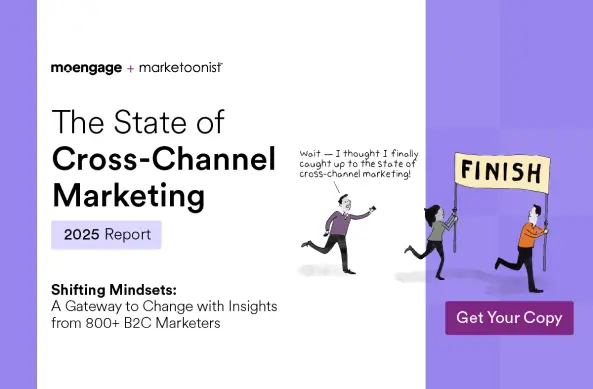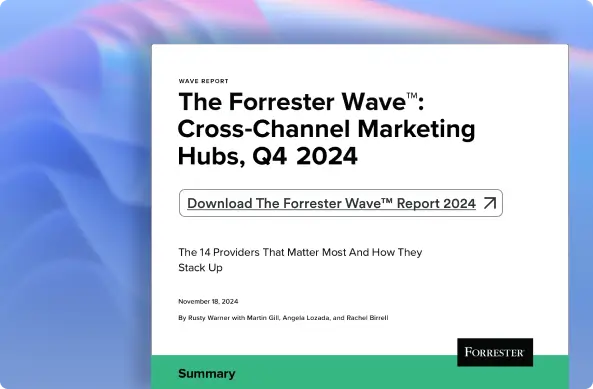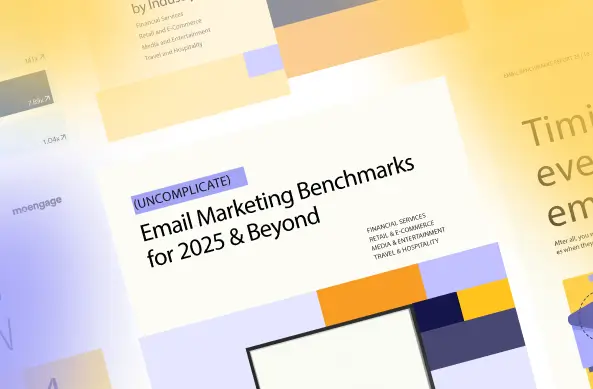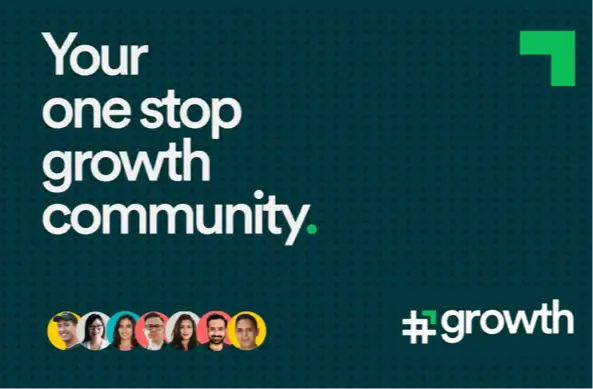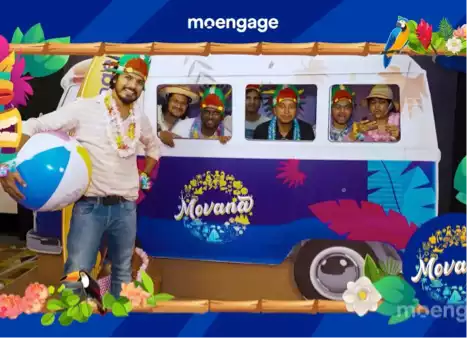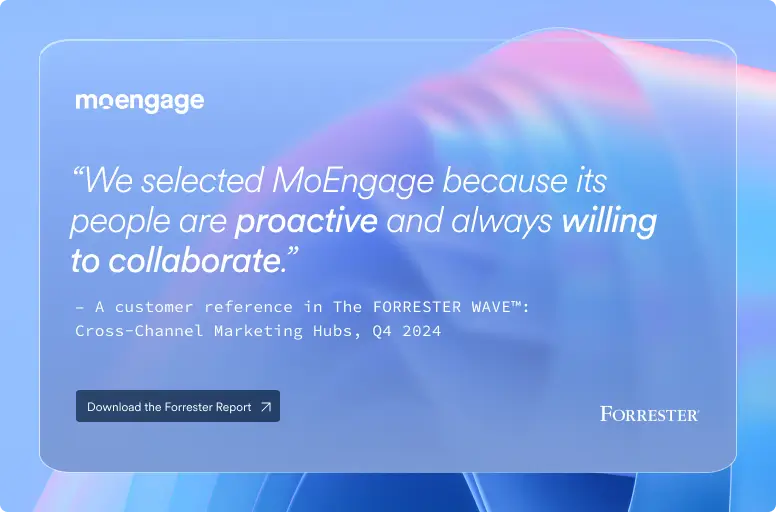5 Actionable Tips to Drive WhatsApp Engagement and Growth
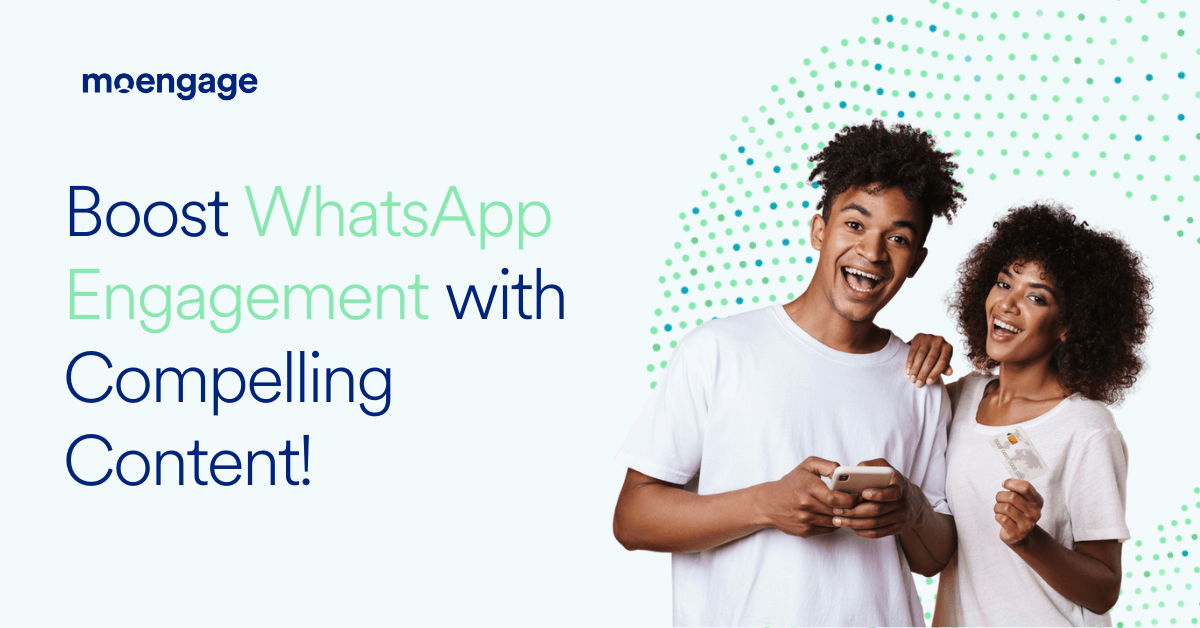
Modern customers demand convenience and familiarity when communicating with businesses. Since they’re exposed to hundreds of digital messaging channels every day, cutting through the noise is tricky—but not impossible.
If you can stay connected with the customer throughout their lifecycle, half the battle is won. A personalized WhatsApp engagement strategy can assist in:
- making your messages stand out
- helping you engage your consumers with meaningful and interesting conversations
- propelling customers further along the sales funnel and improving customer satisfaction
In this guide, we will explore how you can maximize interactions on WhatsApp, the world’s most popular messaging app.
WhatsApp’s Growing Influence on Marketing Campaigns
Currently, one billion people message a business each week collectively on WhatsApp, Messenger, and Instagram Direct.
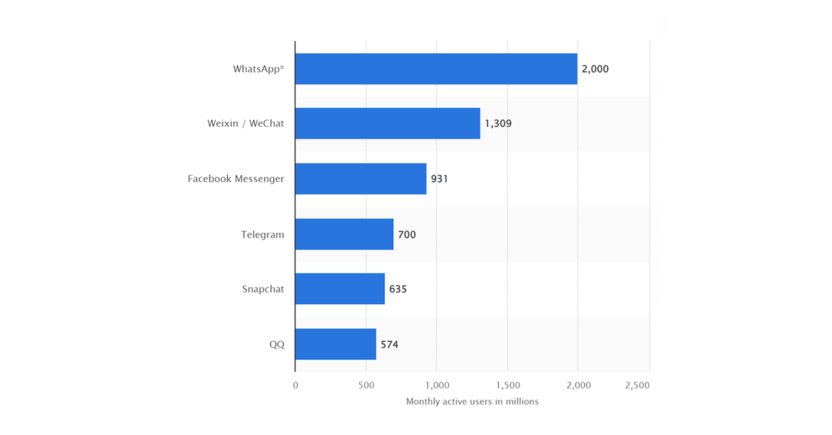
Customers want to chat 1:1 with brands, just as they chat with their friends and family. They want to DM brands, browse through product catalogs or new offers in one click, interact with brand stories, and ask for assistance in real-time. WhatsApp empowers you to do all this and more.
On the business side, WhatsApp doubles up as a powerful marketing tool that allows brands to:
- Capitalize on missed sales by redirecting customers after a failed purchase
- Share important product information such as new product line launches, time-sensitive deals, and discounts, and more with one click
- Automate the customer support process and eliminate hold-time for customers without compromising on support quality
- Gather real-time feedback from customers and pivot strategies to make them more impactful and customer-focused
WhatsApp Marketing: 3 Proven Benefits
Benefit #1: Ever-expanding Reach
Around 25% of the world’s population is currently active on WhatsApp. You can create WhatsApp campaigns from within the app; you don’t need to redirect customers to another platform. This means no extra installations, downloads, or added efforts for your customers.
Benefit #2: Relationship-building
With WhatsApp, customers can enter your brand’s ecosystem without stepping into your offline outlet or entering the online store. You can build personalized WhatsApp messages and create meaningful relationships by:
- Tailoring your content to match the interests of your target audience.
- Adding images, videos, and GIFs to make your messages more engaging.
- Using features like WhatsApp Status, voice messages, and stickers to add variety to your messaging.
- Sharing product updates and making it easy for customers to buy directly from the platform.
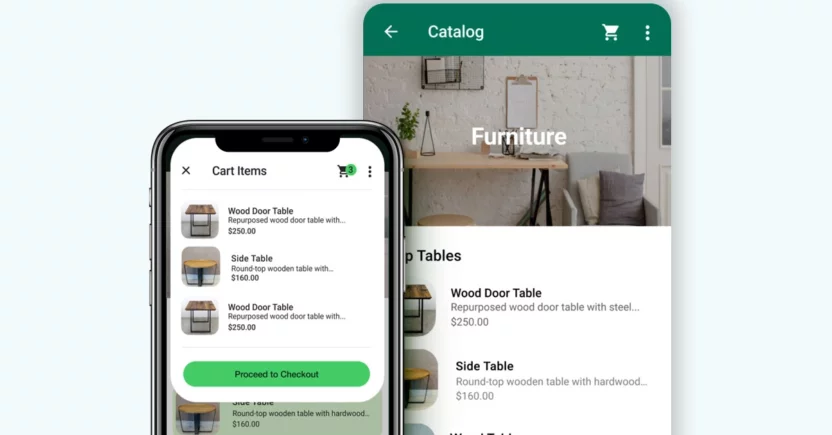
Providing unique and valuable content that is only accessible to your WhatsApp subscribers, creating a sense of exclusivity.
- Encouraging interaction with polls, quizzes, and contests to actively engage your audience.
- Ensuring that you capture customer feedback and make them feel appreciated.
- Answering customer questions in real-time and improving the user experience.
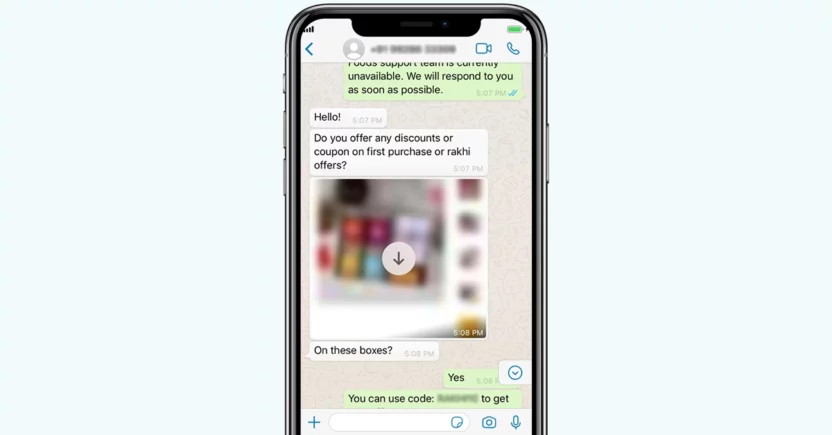
Benefit #3: Seamless Experiences
WhatsApp campaigns can be driven throughout the customer lifecycle. You can drive repeat purchases, promote ongoing customer engagement, upsell, reach out to potential customers, and gather more leads.
Every industry can benefit from WhatsApp business in one way or another. Here are some examples worth considering:
- E-commerce and Retail: E-commerce brands can use WhatsApp to send personalized updates to the customer relating to their ongoing order, wishlist, past purchase, etc.
- Entertainment and OTT: OTT platforms can leverage this IM format to announce new shows, movies, etc. They can also use it to send reminders for subscription renewal.
- Banking and Fintech: The Banking sector too can use WhatsApp to roll out KYC reminders, offer information on insurance services, remind customers about pending credit card payments, and so on.
- Travel and Hospitality: The Hospitality industry actively uses WhatsApp to send booking confirmation updates to customers, provide check-in information for hotels and flights, and more.
| Pro tip: To get started on the right note, select a specific use-case and test it for efficacy before you build a full-fledged campaign. |
3 Examples of WhatsApp Engagement Marketing That Actually Worked
Here are a few use-cases of WhatsApp campaigns that met with great success:
1. Hellmann’s “WhatsCook” Campaign – The First Live Recipe Service via WhatsApp Business API
Objective: To boost customer engagement by helping them use a solution “that is already in their hands”.
The Challenge: Inspire people to use a common cooking ingredient like mayonnaise in new and interesting ways, and build brand awareness.
The Solution: The WhatsCook campaign was built on the central idea of forging a ‘connection.’ People could connect with real chefs to learn how to cook right with the ingredients at hand.
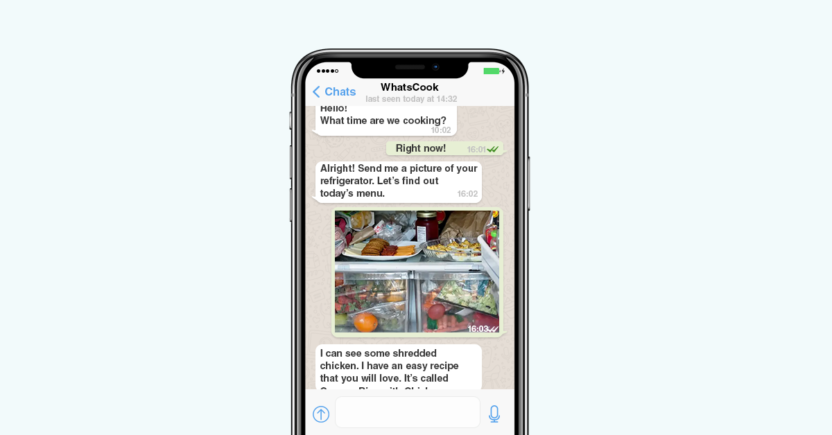
The Results:
- Better engagement: Users interacted for an average of 65 minutes
- Increased signups: 1 in every 2 visitors signed up for the service
- Wider reach: It reached more than 4MM+ people in just 10 days
- User approval: It boasted a user approval of 99.5%
2. Navi Used WhatsApp Business App to Increase Insurance Upsells by 1.5x
Objective: To increase insurance sales to potential customers.
The Challenge: Traditional engagement channels were not helping the brand upsell effectively. The brand realized that customers who were interested in loans were also interested in buying insurance policies. However, the traditional channels did not allow the brand to cater to customers at scale. Plus, the brand was seeking a communication channel that would protect sensitive customer information and remove multiple steps of selling by reaching out to customers instantly.
The Solution: The brand leveraged WhatsApp as a new-age marketing channel through MoEngage. The MoEngage and WhatsApp Business integration created a unique segment of customers who were engaged and interested in what Navi had to offer. Consequently, Navi saw an increase in insurance upsells.
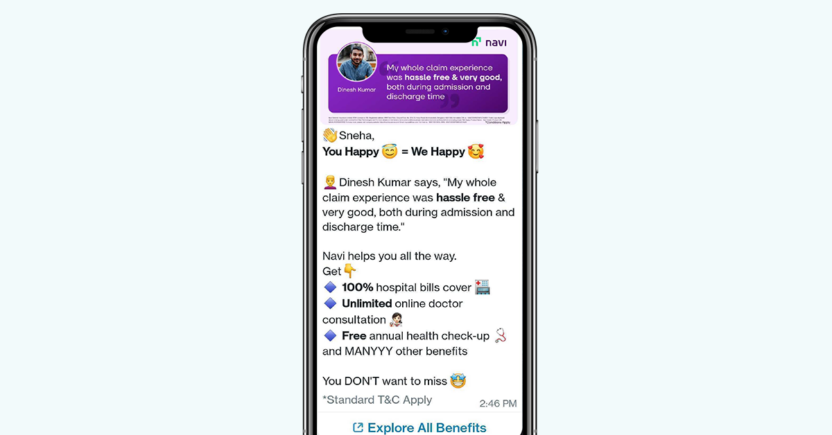
The Results:
- 1.5x increase in insurance upsells
- 120% increase in loan disbursals
| Here are a few more inspirational, ready-to-use campaign ideas on WhatsApp marketing that you may want to check out. |
3. Tata CLiQ Leveraged WhatsApp to Boost ROI by 10x
Objective: To tailor customer engagement by capitalizing on every customer who opts in to receive follow-up communications.
The Challenge: The brand realized that conventional methods (think: email and SMS) were receiving lower open rates. Plus, these channels did not allow for flexible, creative messaging. The need for a targeted, dynamic, reliable, and dedicated communication channel was born.
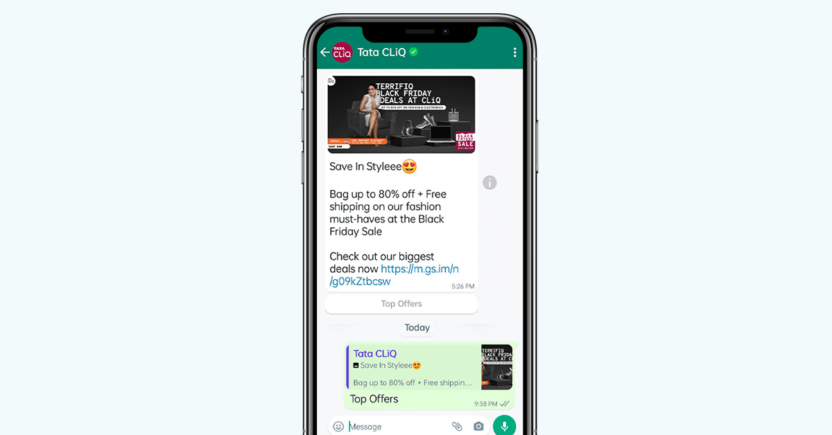
The Solution: The brand leveraged WhatsApp to:
- Deliver custom-fit messages with content and offers tailored to each customer
- Send push notifications and let customers know about their order shipment and transaction numbers
- Drive sophisticated customer targeting and customization, particularly for high-volume sales days (think: Diwali, Black Friday, etc.)
The Results:
- 10x boost in ROI over in-app push notifications, email, and SMS
- 500K USD in sales in 30 days
- 57% clickthrough rate
- 1.7x more likely customers will buy via WhatsApp
5 Winning Strategies for WhatsApp Business Engagement
Long-winded conversations will hardly help you convert on WhatsApp.
If you want to make the most of WhatsApp marketing for conversational commerce, consider these expert-approved strategies:
1. Converse, Converse, Converse to Build a Rapport
Conversations are the bedrock of customer engagement, and your WhatsApp Business account allows you to be available for customers 24×7, interacting and addressing customer queries.
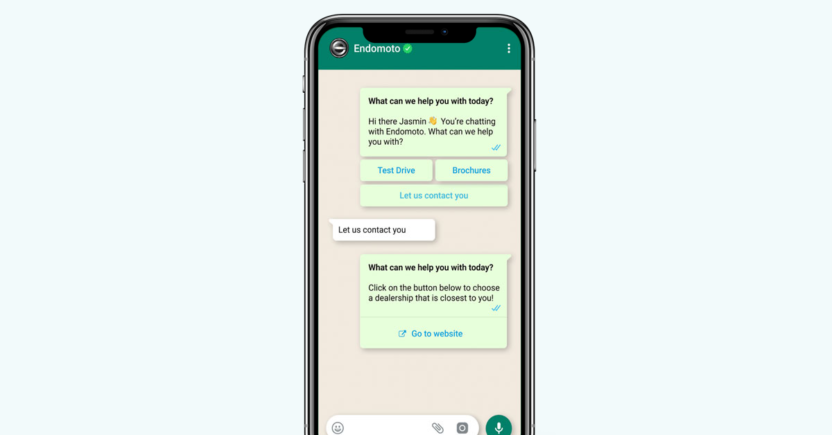
Using WhatsApp Business API, you can showcase product brochures, encourage customers to book a test drive, or have your team contact them at their convenience. Use personalized conversation starters to convert customer connections into ROI-driven conversations. For instance, Clarks leveraged WhatsApp to improve sales for its ‘Desert Boots’ collection.
In the campaign titled “Rats to Rudeboys,” WhatsApp customers could live-chat with various characters that related to the origins of the boot. They could also get images, music, videos, etc., and experience a more ‘hands-on’ documentary experience, all at their fingertips.
2. Optimize Your WhatsApp Business Profile to Establish Trust
Think of your WhatsApp Business profile as your virtual storefront that allows you to grow revenue and engagement.
To make the most of your WhatsApp business number, add useful information for your customers, such as your business logo, address, brand description, email address, hours of operation, and website details, as Adya Organics demonstrates below.
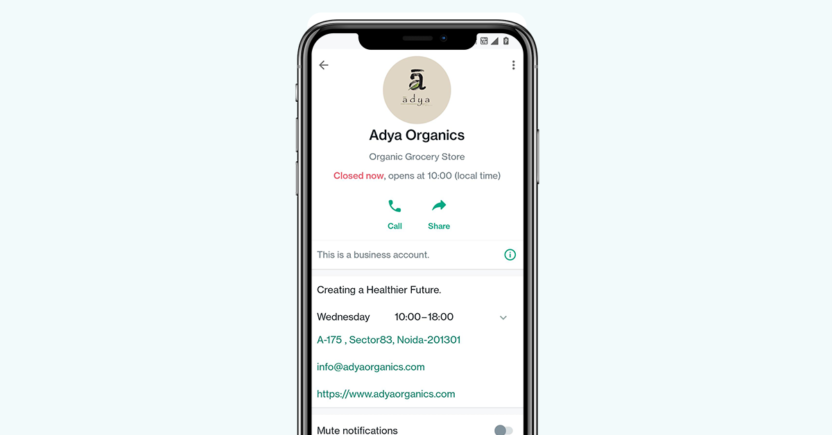
Here are a few things the brand gets right:
- It highlights the store’s operational timings
- It has a short and impactful tagline – “Creating a Healthier Future”
- It showcases the brand’s address, website URL, and email
Pro tips:
|
| Read more: Learn how WhatsApp is different from Messenger from a marketer’s perspective. |
3. Use Automated Messages and Quick Replies to Save Time and Effort
Want customers to reach out to you easily? Highlight the WhatsApp contact option everywhere possible. For starters, you can showcase it on your website as the brand, just like how Two Brothers Organic Farms does it.
The always-on customer of today likes to message brands at their convenience—whether it’s 4 a.m. or a Sunday.
To cater to customers outside of business hours, you want to capitalize on every lead with automated messages and quick replies.
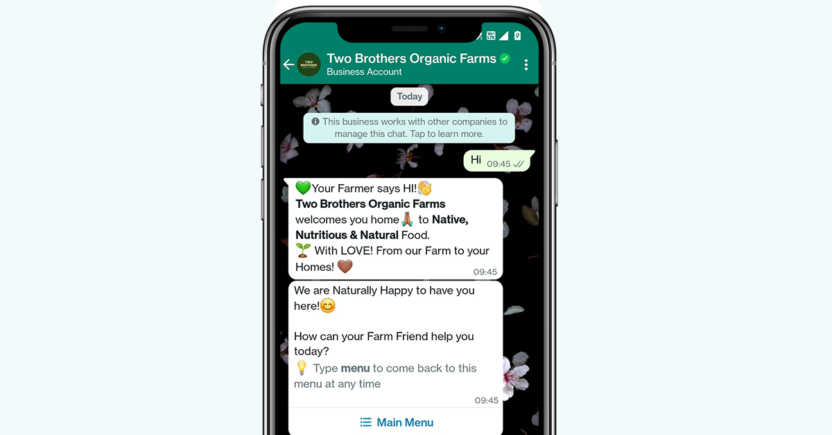
Note that WhatsApp Business allows you to send greeting messages to customers after 14 days of inactivity.
| Pro tip: Add icons, emoticons, etc., to make the greeting message come alive and drive customer engagement.
Once the customer has read the welcome message, offer them a menu with prepopulated options. |
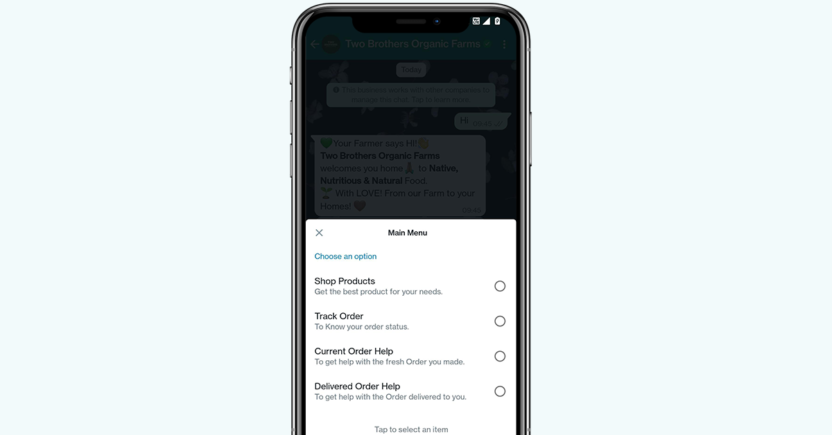
Once the customer selects an option, they are provided with more relevant automated messages to keep the conversation going forward.
The beauty of automated messages is customers don’t need to type long messages to get what they want. Plus, you can save time and energy and focus on what really matters—engaging with your customers and boosting growth as well as revenues.
Pro tips:
|
Include a product catalog to showcase your products/services and empower customers to browse through the offerings effortlessly. Allow customers to also share the product/service details with their friends and family.
4. Create Labels and Stay Organized
Another strategy to stay on top of your business conversations and important chats is to use labels and color code them.
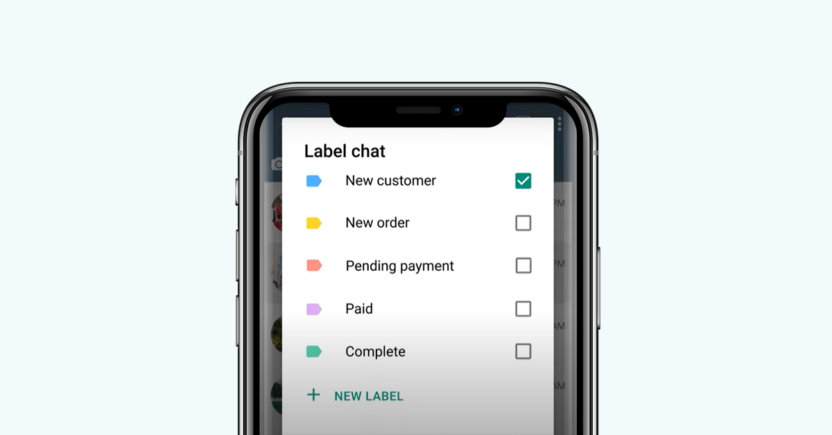
You can filter customers on various parameters, such as new customers, pending payments, and so on. This way, no customer goes unnoticed, and your brand benefits from streamlined communication.
5. Leverage a Variety of Use-Cases to Keep Customers Engaged and Entertained
Effective WhatsApp marketing is about providing value, fostering engagement, and building strong relationships with your customers.
To achieve this, you need to understand the various market dynamics at play and analyze how your brand fits into the overall business landscape to create meaningful interactions through the platform. Some specific examples include:
- Allowing customers to check product availability or reserve items in-store as Sephora’s Text and Collect feature demonstrates
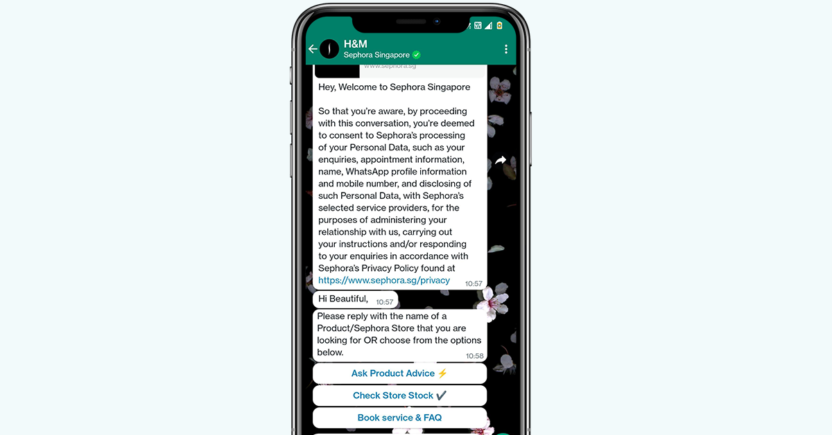
Customers are required to choose the relevant option at every step of the way.
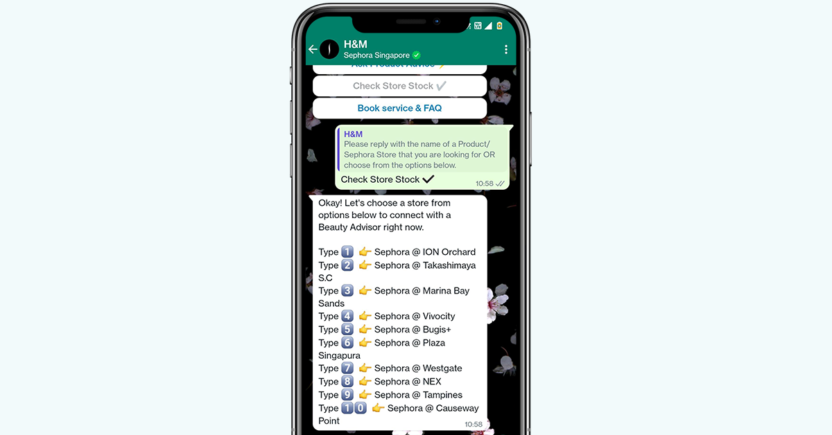
The best part? If an agent is not available to assist, the brand lets the customer know and encourages them to share more information to help reserve the product.
- Having a dedicated WhatsApp helpline for troubleshooting or inquiries.
- Asking customers to rate their experience and provide suggestions via surveys or feedback requests on WhatsApp.
- Providing exclusive previews of upcoming products or events and sharing behind-the-scenes footage of a product launch.
- Showcasing products with interactive catalogs and allowing customers to inquire or make purchases.
- Tailoring exclusive discounts based on customer preferences. For instance, sending a personalized discount code for a favorite product category.
- Engaging customers with WhatsApp quizzes or contests to boost interactivity
- Highlighting customer testimonials and building goodwill.
- Hosting real-time interaction opportunities such as conducting a live Q&A with experts about a particular topic, say, investment strategies.
- Facilitating group discussions and sharing user-generated content to build a community of like-minded customers.
The Road Ahead
Businesses must leverage WhatsApp messaging not simply to interact but drive meaningful conversations with customers. However, orchestrating personalized WhatsApp campaigns requires you to look at your organization’s marketing from a more holistic lens, along with an in-depth understanding of your customer’s evolving needs and wants.
This is possible by building a strong omnichannel plan with email, SMS, and mobile app customer engagement strategies. If you want to curate a successful and integrative WhatsApp campaign, a channel-agnostic customer engagement platform, such as MoEngage, can help you launch a killer omnichannel marketing strategy.
Learn more about how you can leverage WhatsApp for your business and boost customer engagement, retention, and revenue with MoEngage’s new WhatsApp Business Integration. Connect with the team to know more.

